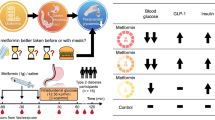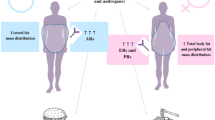Abstract
The long-term effects of lifestyle changes, diet and medical therapy on obesity are limited. Bariatric surgery is the most effective long-term treatment with the greatest chances for amelioration of obesity-associated complications, including type 2 diabetes mellitus (T2DM). There is increasing evidence in the literature that bariatric operations have a profound effect on human physiology, by reducing hunger, increasing satiety, paradoxically increasing energy expenditure, and even promoting healthy food preferences. Some of these operations improve glucose homeostasis in patients with T2DM independently of weight loss. Changes in the gut hormone levels of glucagon-like peptide 1, peptide YY and ghrelin have been proposed as some of the mediators implicated in changing physiology. The aim of this review is to critically explore the current knowledge on the putative mechanisms of the change in weight and improvement in T2DM glycaemic control after the most commonly performed bariatric operations.
Similar content being viewed by others
References
Papers of particular interest, published recently, have been highlighted as: • Of importance •• Of outstanding importance
Haslam DW, James WP. Obesity. Lancet. 2005;366(9492):1197–209. doi:10.1016/s0140-6736(05)67483-1.
Tsai AG, Wadden TA. Systematic review: an evaluation of major commercial weight loss programs in the United States. Ann Intern Med. 2005;142(1):56–66.
Torgerson JS, Hauptman J, Boldrin MN, Sjostrom L. XENical in the prevention of diabetes in obese subjects (XENDOS) study: a randomized study of orlistat as an adjunct to lifestyle changes for the prevention of type 2 diabetes in obese patients. Diabetes Care. 2004;27(1):155–61.
Sjostrom L, Peltonen M, Jacobson P, et al. Bariatric surgery and long-term cardiovascular events. JAMA. 2012;307(1):56–65. doi:10.1001/jama.2011.1914.
•• Mingrone G, Panunzi S, De Gaetano A, et al. Bariatric Surgery versus Conventional Medical Therapy for Type 2 Diabetes. N Engl J Med. 2012. doi:10.1056/NEJMoa1200111. Very important randomised controlled trial that compared two different types of bariatric procedures (RYGB and BPD) to conventional treatment for diabetes remission. Both operations were significantly more effective in diabetes remission compared to conservative treatment.
•• Schauer PR, Kashyap SR, Wolski K, et al. Bariatric Surgery versus Intensive Medical Therapy in Obese Patients with Diabetes. N Engl J Med. 2012. doi:10.1056/NEJMoa1200225. Very important randomised controlled trial that compared two different types of bariatric procedures (RYGB and SG) to conventional treatment for diabetes remission. Both operations were significantly more effective in diabetes remission compared to conservative treatment.
Dixon JB, O'Brien PE, Playfair J, et al. Adjustable gastric banding and conventional therapy for type 2 diabetes: a randomized controlled trial. JAMA. 2008;299(3):316–23. doi:10.1001/jama.299.3.316.
Sandoval D. Bariatric surgeries: beyond restriction and malabsorption. Int J Obes (Lond). 2011;35 Suppl 3:S45–9. doi:10.1038/ijo.2011.148.
Cornicelli M, Noli G, Marinari GM, Adami GF. Dietary habits and body weight at long-term following biliopancreatic diversion. Obes Surg. 2010;20(9):1278–80. doi:10.1007/s11695-010-0111-5.
• Odstrcil EA, Martinez JG, Santa Ana CA, et al. The contribution of malabsorption to the reduction in net energy absorption after long-limb Roux-en-Y gastric bypass. Am J Clin Nutr. 2010;92(4):704–13. doi:10.3945/ajcn.2010.29870. A study that showed that caloric malabsorption accounts for only 6–11 % of the total reduction in energy absorption after an RYGB with gastric limb >150cm.
MacLean LD, Rhode BM, Nohr CW. Long- or short-limb gastric bypass? J Gastrointest Surg. 2001;5(5):525–30.
Halmi KA, Mason E, Falk JR, Stunkard A. Appetitive behavior after gastric bypass for obesity. Int J Obes. 1981;5(5):457–64.
Tadross JA, le Roux CW. The mechanisms of weight loss after bariatric surgery. Int J Obes (Lond). 2009;33 Suppl 1:S28–32. doi:10.1038/ijo.2009.14.
Olbers T, Bjorkman S, Lindroos A, et al. Body composition, dietary intake, and energy expenditure after laparoscopic Roux-en-Y gastric bypass and laparoscopic vertical banded gastroplasty: a randomized clinical trial. Ann Surg. 2006;244(5):715–22. doi:10.1097/01.sla.0000218085.25902.f8.
Karra E, Yousseif A, Batterham RL. Mechanisms facilitating weight loss and resolution of type 2 diabetes following bariatric surgery. Trends Endocrinol Metab. 2010;21(6):337–44. doi:10.1016/j.tem.2010.01.006.
• Valderas JP, Irribarra V, Boza C, et al. Medical and surgical treatments for obesity have opposite effects on peptide YY and appetite: a prospective study controlled for weight loss. J Clin Endocrinol Metab. 2010;95(3):1069–75. doi:10.1210/jc.2009-0983. A study that demonstrated that there is increased satiety in the early postoperative period after RYGB and SG when on the other hand appetite after dieting remained the same. The same study showed increased postprandial levels of Peptide YY after both bariatric procedures but no difference in postprandial Peptide YY levels after dieting. A positive correlation between postprandial PYY levels and postprandial satiety was found.
le Roux CW, Aylwin SJ, Batterham RL, et al. Gut hormone profiles following bariatric surgery favor an anorectic state, facilitate weight loss, and improve metabolic parameters. Ann Surg. 2006;243(1):108–14.
Dixon AF, Dixon JB, O'Brien PE. Laparoscopic adjustable gastric banding induces prolonged satiety: a randomized blind crossover study. J Clin Endocrinol Metab. 2005;90(2):813–9. doi:10.1210/jc.2004-1546.
Seyfried F, le Roux CW, Bueter M. Lessons learned from gastric bypass operations in rats. Obes Facts. 2011;4 Suppl 1:3–12. doi:10.1159/000327301.
Bjorklund P, Laurenius A, Een E, et al. Is the Roux limb a determinant for meal size after gastric bypass surgery? Obes Surg. 2010;20(10):1408–14. doi:10.1007/s11695-010-0192-1.
Bueter M, le Roux CW. Gastrointestinal hormones, energy balance and bariatric surgery. Int J Obes (Lond). 2011;35 Suppl 3:S35–9. doi:10.1038/ijo.2011.146.
Stylopoulos N, Hoppin AG, Kaplan LM. Roux-en-Y gastric bypass enhances energy expenditure and extends lifespan in diet-induced obese rats. Obesity (Silver Spring). 2009;17(10):1839–47. doi:10.1038/oby.2009.207.
Flancbaum L, Choban PS, Bradley LR, Burge JC. Changes in measured resting energy expenditure after Roux-en-Y gastric bypass for clinically severe obesity. Surgery. 1997;122(5):943–9.
Carrasco F, Papapietro K, Csendes A, et al. Changes in resting energy expenditure and body composition after weight loss following Roux-en-Y gastric bypass. Obes Surg. 2007;17(5):608–16.
Benedetti G, Mingrone G, Marcoccia S, et al. Body composition and energy expenditure after weight loss following bariatric surgery. J Am Coll Nutr. 2000;19(2):270–4.
Stefater MA, Perez-Tilve D, Chambers AP, et al. Sleeve gastrectomy induces loss of weight and fat mass in obese rats, but does not affect leptin sensitivity. Gastroenterology. 2010;138(7):2426–36, e1–3. doi:10.1053/j.gastro.2010.02.059.
Bueter M, Lowenstein C, Olbers T, et al. Gastric bypass increases energy expenditure in rats. Gastroenterology. 2010;138(5):1845–53. doi:10.1053/j.gastro.2009.11.012.
Suzuki K, Jayasena CN, Bloom SR. The gut hormones in appetite regulation. J Obes. 2011;2011:528401. doi:10.1155/2011/528401.
•• Carnell S, Gibson C, Benson L, et al. Neuroimaging and obesity: current knowledge and future directions. Obes Rev. 2012;13(1):43–56. doi:10.1111/j.1467-789X.2011.00927.x. This review summarises the knowledge derived from neuroimaging on functional changes in obesity, interpretes its conflicting findings, and provides a unifying theory in an attempt to explain the controversy.
Ernst B, Thurnheer M, Wilms B, Schultes B. Differential changes in dietary habits after gastric bypass versus gastric banding operations. Obes Surg. 2009;19(3):274–80. doi:10.1007/s11695-008-9769-3.
Kenler HA, Brolin RE, Cody RP. Changes in eating behavior after horizontal gastroplasty and Roux-en-Y gastric bypass. Am J Clin Nutr. 1990;52(1):87–92.
•• Mathes CM, Spector AC. Food selection and taste changes in humans after Roux-en-Y gastric bypass surgery: A direct-measures approach. Physiol Behav. 2012. doi:10.1016/j.physbeh.2012.02.013. Excellent review and critical evaluation of the published studies on the changes in food preferences in humans after gastric bypass surgery.
• Ochner CN, Kwok Y, Conceicao E, et al. Selective reduction in neural responses to high calorie foods following gastric bypass surgery. Ann Surg. 2011;253(3):502–7. doi:10.1097/SLA.0b013e318203a289. The first functional magnetic resonance study to show that the activation of the brain reward network to high calorie food is reduced after gastric bypass surgery.
Ochner CN, Stice E, Hutchins E, et al. Relation between changes in neural responsivity and reductions in desire to eat high-calorie foods following gastric bypass surgery. Neuroscience. 2012;209:128–35. doi:10.1016/j.neuroscience.2012.02.030.
• Bueter M, Miras AD, Chichger H, et al. Alterations of sucrose preference after Roux-en-Y gastric bypass. Physiol Behav. 2011;104(5):709–21. doi:10.1016/j.physbeh.2011.07.025. This study assessed the changes in preferences for sweet stimuli in humans and animals after gastric bypass surgery.
le Roux CW, Bueter M, Theis N, et al. Gastric bypass reduces fat intake and preference. Am J Physiol Regul Integr Comp Physiol. 2011;301(4):R1057–66. doi:10.1152/ajpregu.00139.2011.
• Wilson–Perez HE, Chambers AP, Sandoval DA, et al. The effect of vertical sleeve gastrectomy on food choice in rats. Int J Obes (Lond). 2012. doi:10.1038/ijo.2012.18. This study assessed the changes in preferences for high calorie food in animals after sleeve gastrectomy surgery.
Spector AC. Linking gustatory neurobiology to behavior in vertebrates. Neurosci Biobehav Rev. 2000;24(4):391–416.
Scruggs DM, Buffington C, Cowan Jr GS. Taste Acuity of the Morbidly Obese before and after Gastric Bypass Surgery. Obes Surg. 1994;4(1):24–8. doi:10.1381/096089294765558854.
Burge JC, Schaumburg JZ, Choban PS, et al. Changes in patients' taste acuity after Roux-en-Y gastric bypass for clinically severe obesity. J Am Diet Assoc. 1995;95(6):666–70. doi:10.1016/s0002-8223(95)00182-4.
Rolls ET. Taste, olfactory and food texture reward processing in the brain and obesity. Int J Obes (Lond). 2011;35(4):550–61. doi:10.1038/ijo.2010.155.
Berridge KC. Food reward: brain substrates of wanting and liking. Neurosci Biobehav Rev. 1996;20(1):1–25.
• Shin AC, Zheng H, Pistell PJ, Berthoud HR. Roux-en-Y gastric bypass surgery changes food reward in rats. Int J Obes (Lond). 2010. doi:10.1038/ijo.2010.174. This study assessed the changes in the reward value of high calorie food in animals after gastric bypass surgery.
Mathes CM, Bueter M, Smith KR, et al. Roux-en-Y Gastric Bypass in Rats Increases Sucrose Taste-Related Motivated Behavior Independent of Pharmacological GLP-1-Receptor Modulation. Am J Physiol Regul Integr Comp Physiol. 2011. doi:10.1152/ajpregu.00214.2011.
Hajnal A, Kovacs P, Ahmed T, et al. Gastric bypass surgery alters behavioral and neural taste functions for sweet taste in obese rats. Am J Physiol Gastrointest Liver Physiol. 2010;299(4):G967–79. doi:10.1152/ajpgi.00070.2010.
Cummings DE, Overduin J, Foster-Schubert KE. Gastric bypass for obesity: mechanisms of weight loss and diabetes resolution. J Clin Endocrinol Metab. 2004;89(6):2608–15. doi:10.1210/jc.2004-0433.
Thaler JP, Cummings DE. Minireview: Hormonal and metabolic mechanisms of diabetes remission after gastrointestinal surgery. Endocrinology. 2009;150(6):2518–25. 10.1210/en.2009-0367.
• Pournaras DJ, Osborne A, Hawkins SC, et al. Remission of type 2 diabetes after gastric bypass and banding: mechanisms and 2 year outcomes. Ann Surg. 2010;252(6):966–71. doi:10.1097/SLA.0b013e3181efc49a. A significant study that showed that despite the similar weight loss after RYGB and LAGB, diabetes remission was significantly higher after RYGB (72%), 2 years after the operation. It also showed that in the early postoperative period, only patients after RYGB have significant improvement in insulin resistance, insulin production, and GLP-1 responses.
Cummings BP, Strader AD, Stanhope KL, et al. Ileal interposition surgery improves glucose and lipid metabolism and delays diabetes onset in the UCD-T2DM rat. Gastroenterology. 2010;138(7):2437–46, e1. doi:10.1053/j.gastro.2010.03.005.
Rubino F, Forgione A, Cummings DE, et al. The mechanism of diabetes control after gastrointestinal bypass surgery reveals a role of the proximal small intestine in the pathophysiology of type 2 diabetes. Ann Surg. 2006;244(5):741–9. doi:10.1097/01.sla.0000224726.61448.1b.
Rubino F, Marescaux J. Effect of duodenal-jejunal exclusion in a non-obese animal model of type 2 diabetes: a new perspective for an old disease. Ann Surg. 2004;239(1):1–11. doi:10.1097/01.sla.0000102989.54824.fc.
Breen DM, Rasmussen BA, Kokorovic A et al. Jejunal nutrient sensing is required for duodenal-jejunal bypass surgery to rapidly lower glucose concentrations in uncontrolled diabetes. Nat Med. 2012;advance online publication. doi:http://www.nature.com/nm/journal/vaop/ncurrent/abs/nm.2745.html#supplementary-information.
•• Schouten R, Rijs CS, Bouvy ND, et al. A multicenter, randomized efficacy study of the EndoBarrier Gastrointestinal Liner for presurgical weight loss prior to bariatric surgery. Ann Surg. 2010;251(2):236–43. doi:10.1097/SLA.0b013e3181bdfbff. This is a very important study that showed the efficacy of Duodenal- Jejunal Sleeve in weight loss and diabetes remission in morbidly obese patients.
Acknowledgments
Alexander D. Miras is funded by the Medical Research Council Research Training Fellowship G0902002. There are no conflicts of interest in relation to this work.
Disclosure
No potential conflicts of interest relevant to this article were reported.
Author information
Authors and Affiliations
Corresponding author
Rights and permissions
About this article
Cite this article
Papamargaritis, D., Panteliou, E., Miras, A.D. et al. Mechanisms of Weight Loss, Diabetes Control and Changes in Food Choices After Gastrointestinal Surgery. Curr Atheroscler Rep 14, 616–623 (2012). https://doi.org/10.1007/s11883-012-0283-7
Published:
Issue Date:
DOI: https://doi.org/10.1007/s11883-012-0283-7




